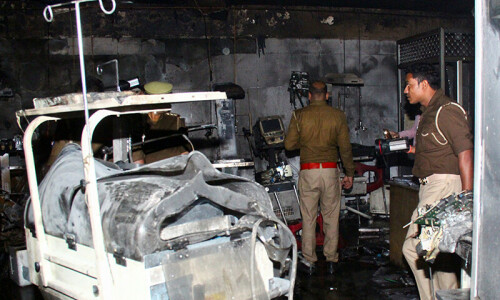ANOTHER militant attack, another reminder that the long war against militancy continues.
Eleven military personnel died and several more were injured in a suicide attack in Swat on Saturday. The first major bombing in five years in the region has shattered a steady peace that had been painstakingly built.
A spate of gun attacks had disrupted the peace more than a year ago, but the intelligence and security apparatus has progressively helped Swat in particular and the Malakand region in general return to peaceful normality.
There are no known militant hideouts left in the region and it is likely that the suicide bomber entered Swat from the adjoining Dir district or Bajaur Agency, which border Kunar province in eastern Afghanistan.
Kunar is believed to be where Maulana Fazlullah, the head of the Swat faction of the banned TTP, has found sanctuary.
Certainly, without facilitation inside Pakistan, the suicide bomber would not have reached his target and that is a challenge that the Pakistani state must address.
Yet, the attack in Swat has underlined a broader truth about the regional war against militancy: cross-border attacks in Pakistan and Afghanistan will not end until the two states find a way to step up security cooperation and sustain that cooperation over the long term.
The shocking and brutal attacks in recent weeks in Afghanistan have shaken the government there and led to urgent security consultations with Pakistan.
There has been finger-pointing by some Afghan officials, but the two country’s security and political leaderships by and large have indicated that cooperation is what they are seeking.
Now, with Swat attacked again and significant military casualties suffered by Pakistan, renewed efforts will likely have to be made in the middle of an already tense diplomatic situation to prevent a fresh round of accusations and recriminations breaking out.
An original truth still applies: when Afghanistan and Pakistan ties fray, it is the militants who benefit.
Clearly, Pakistan cannot simply wait for the Afghan government to extend greater cooperation and for the Afghan security forces to be able to exert greater influence in eastern Afghanistan, where the anti-Pakistan militant sanctuaries primarily are.
The remnants of the Swat TTP network need to be uprooted and the paths into Pakistan from Afghanistan that militants use better monitored or closed off.
But the steps taken ought to be sensible and balanced against the need to keep Pak-Afghan relations from unravelling.
Periodic and intensifying efforts to eject Afghan refugees from Pakistan, for example, are unnecessary, unwise and wrongly vilify an entire community of vulnerable people.
Militants and sanctuaries are a problem on both sides of the Pak-Afghan border, not the wider populations that reside there.
After so much bloodshed, after periodic eruptions and frequent dips in Pak-Afghan relations, surely the two countries must recognise that cooperation is unavoidable and inevitable.
Published in Dawn, February 5th, 2018









































